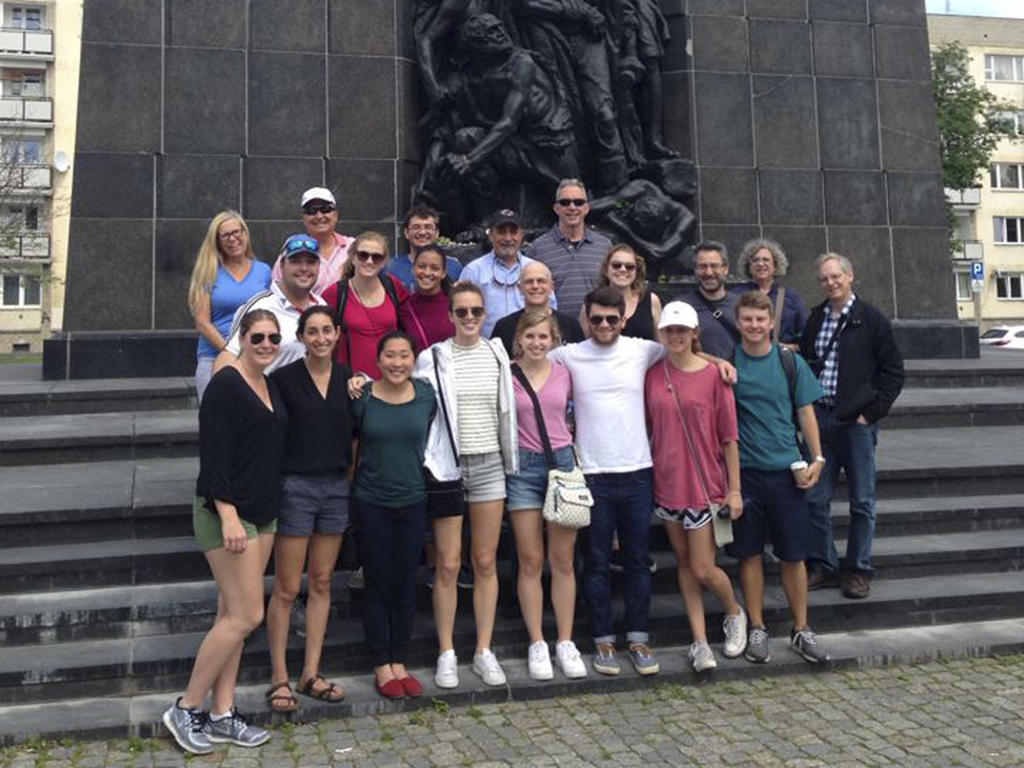This summer a group of Rhodes students, parents, recent graduates, and a member from the Memphis Jewish community went on the first Rhodes-led Holocaust Travel Seminar. This summer program took its members through Germany, Poland, and the Czech Republic to explore Jewish and non-Jewish life before, during, and after the Holocaust.
The seminar was led by Dr. Stephen Haynes of the Department of Religious Studies, who provided an understanding of the theological responses to the Holocaust and Jewish-Christian relations; Dr. Jonathan Judaken of the Department of History and the Spence L. Wilson Chair in Humanities, who shared his knowledge of the history of the Jewish people and anti-Semitic thought; and University of Memphis professor Dr. Daniel Unowsky, who gave insight into Jewish life in Europe during the 20th century.
The overlapping areas of expertise but still unique academic perspectives of the seminar leaders allowed the material to be covered in great depth. Alex Saharovich, who accompanied his son Daniel Sarahovich ’19 on the trip, says, “Whether in Berlin, Prague, Krakow, or Warsaw, our experience was magnified by the intelligent, creative and thoughtful presentation by Professors Haynes, Judaken, and Unowsky.”
This expertise complemented the authentic learning experience that comes from visiting both internationally renowned museums and historical sites such as Buchenwald, Terezin, Treblinka, and Auschwitz. Meryl Rosen, a member of the Memphis Jewish community, recounts that the professors took the group to lesser known memorials that tour guides might miss, such as when Unowsky led the group to an area between two apartment buildings in Warsaw to observe a plaque commemorating the Jewish ghettos that once existed at that location.
Being in the places where the Holocaust took place and where the victims lived enhances the learning experience and one’s appreciation for what actually happened, says Judaken. “Connecting to the emotional experience changes your understanding.” Haynes adds that seeing where the Warsaw Jewish community lived re-centers the topic to people, and not just information: “This emphasis on Jewish life before the Holocaust was valuable in giving the students a sense of what was lost.”
Mark Farley ’16 agrees, saying, “In a traditional classroom setting, one will read about the accounts of the Holocaust. You see large numbers—“three million killed”—on the pages you read and descriptions of the ghettoes and camps, but, for me at least, the reality of the situation never fully sank in.” Rose Zeng ’18 adds, “You can grasp the fact that the Holocaust took place, but understanding even a glimpse of what the victims might have experienced cannot be found simply in the text.”
Unowsky describes other locations where history came alive, including a visit to the Topography of Terror exhibition in Berlin, situated at what had been the former Gestapo and SS headquarters. “Directly across the street looms the massive Nazi air force ministry building (today housing the German Finance Ministry) once headed by Hermann Goering, Hitler’s official number two in the Nazi government hierarchy. On July 31, 1941, Goering sent an order across the street to the SS headquarters authorizing Reinhard Heydrich, the SS general and right-hand of Heinrich Himmler, to organize and implement a ‘Final Solution’ to the ‘Jewish Question.’” Later the group visited Wannsee House, a lakeside villa outside the city center where Heydrich organized a meeting to coordinate the murderous Final Solution.
The seminar also examined anti-Nazi dissidents, such as Dietrich Bonhoeffer. “Not all Germans were Nazis,” says Haynes. “Some did resist, but the options for resistance were limited.”
Long days immersed in the history of the Holocaust sometimes left the group emotionally drained. Farley says, “At the end of each day, we—including the professors—were mentally exhausted from the many tears and heavy sighs at the different sites. We needed time to decompress, so built into our schedule were times where we could do that.” Their itinerary included seeing the other sights of the cities, shopping, and enjoying amazing meals. Virginia Carr ’18 admits, “We truly ate our way through these three countries.”
The overall impact of the seminar is clear, though. “I hope that this trip shapes the students’ understanding of how and why the Holocaust happened,” says Judaken, “and how they understand their own ethical responsibility.”
For Daniel Saharovich, this was definitely the case. “I feel that I am a different person after this trip. I think I have become more aware of the enormous atrocities that are going on in the world. I also believe that I am more tolerant of people.”
By Drew McCormick ’18
Visit the Holocaust Travel Seminar's Facebook page to see more pictures and materials related to the seminar.
